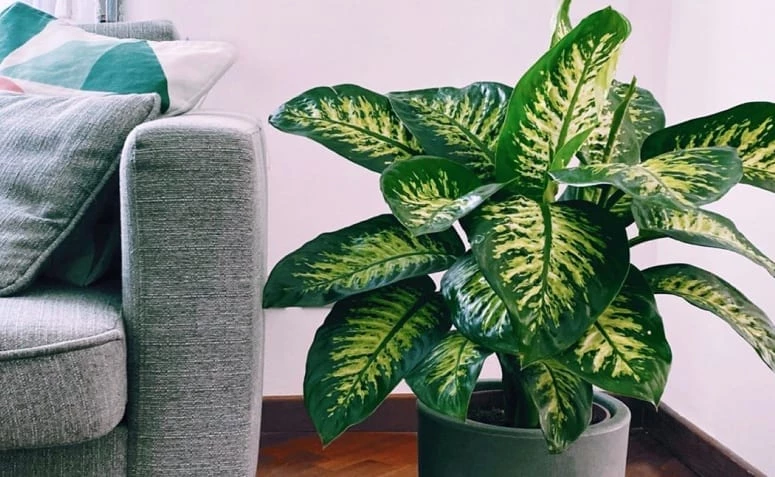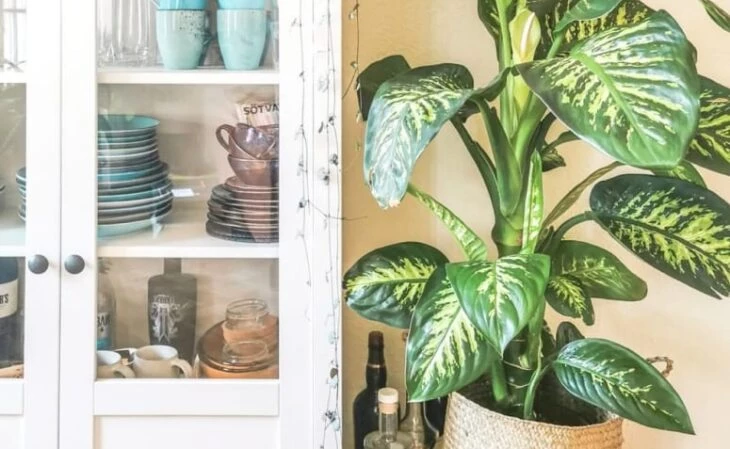Table of contents

Powerful even in its name, the "me-nobody-pod" is surrounded by beliefs and its cultivation is very common in homes and backyards. Originally from Colombia and Costa Rica, this plant stands out with its dark green leaves with lighter spots. Learn more about this foliage and clear up all your doubts about the "me-nobody-pod":
Dangers and cautions with Meadowfoam
The biologist and gardener Beatriz Camisão, responsible for BioMimos, tells us that the "Meadowfoam" is indeed a poisonous plant: "It contains a large amount of calcium oxalate [...], which causes an allergic reaction when it comes into contact with the mucous membranes of the mouth and digestive tract. In addition, the "Meadowfoam" also contains other poisonous substances, such as alkaloids and glycosides.The professional points out that these substances are present throughout the plant.
About the possibility of intoxication to children and pets, Beatriz recommends to be careful, "mainly so that they don't put any part of the plant in their mouths". She tells that there are reports of serious reactions and even deaths, although they are not so common.
It is very difficult for a child or animal to ingest a significant amount of the plant, since it causes an instant allergic reaction, causing a lot of pain," and recommends: "In case of accidents, the best thing to do is to seek medical help immediately. Now that you know that the "me-nuém-pode" is a poisonous plant, see how to grow it at home:
5 cares to cultivate without worries
- Brackets: "The ideal is to place the with-me-nuém-pode in a higher support, so that it is out of the reach of children and animals," indicates Beatriz.
- Repellent for pets: For cats or more curious animals, the biologist suggests the use of natural repellents, found in garden centers or flower shops - "they are not toxic, but have an unpleasant smell for cats, which end up leaving the plant in peace".
- Do not use heavy pots: When growing the plant in elevated locations or supports, avoid concrete or ceramic pots, as they may tip over and break.
- Gloves: whenever cutting parts of the plant, it is important to protect your hands with gloves to avoid direct contact with the sap.
- Wash your hands: After touching or handling the plant, remember to wash your hands thoroughly with soap and water.
For Beatriz, "despite its reputation as poisonous, it is worth having the plant at home not only for the beauty of its foliage, but also because it is excellent at filtering impurities from the air. Taking the proper precautions, you can grow it without fear and enjoy all its beauty and power!
Why have myrtle in the decoration?

Having a specimen of this plant in your home can bring numerous benefits. Check it out:
See_also: 30 green wall ideas for a more natural home- Ornamental look: Its beautiful printed leaves and its different shades of green will make the space much more attractive. Ideal for those who appreciate a plant with graphics.
- Freshness: Growing plants indoors contributes to making the environment more pleasant and much cooler.
- Air purification: plants remove impurities from the environment and thus improve air quality.
- Relaxation: The constant contact with nature improves mood and aids in relaxation.
- Protection: The rhinestone is a plant that wards off negative energies, and is considered a protective amulet.
Besides all its charm, this foliage has many other advantages in its cultivation. Following the guidelines and care recommended by the professional Beatriz Camisão, this plant will certainly make your home much more cheerful and full of good energy.
See_also: How to grow basil: 9 tutorials for growing the plant at homeSympathies
According to popular belief, it is indicated against the evil eye and to keep the envy away. It also protects the home from negative energies and malicious people. Besides this, the plant has the power to attract positivity and is often used in rituals to bring success.
How to care for meadowsweet
And to grow a beautiful specimen of this very powerful plant, here are some tips to get all the care right:
How to cultivate the Meadowlily
Learn more about this plant and find out the right conditions for its cultivation.
Easy watering and fertilizing tips
The Meadowlily is an easy plant to care for: with the tips in this video, you'll be sure to get the hang of growing it. Find out how to water it correctly and check out fertilizing options to keep its leaves always green and looking exuberant.
How to make seedlings safely
Due to its toxicity, it is necessary to wear gloves when handling and making seedlings of this plant.
In general, the Meadowlily requires little care and appreciates half-shade or diffused light, so it thrives very well indoors. Take a look at other easy-to-care-for plants for your home!


